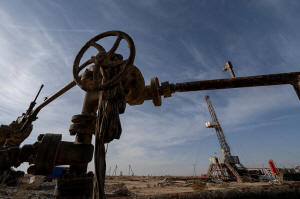|
Brent crude futures were up 18 cents, or 0.2%, at $79.70 a
barrel by 1040 GMT. U.S. West Texas Intermediate crude futures
rose 16 cents, or 0.2%, to $76.47.
Both benchmarks have lost more than 7% over the past four weeks
in the longest run of weekly losses this year.
"Weak economic growth in major economies could stifle oil demand
despite increased tensions in the Middle East that could impact
supplies," said Panmure Liberum analyst Ashley Kelty.
Economic data from top oil importer China and a survey showing
weaker manufacturing activity across Asia, Europe and the United
States raised the risk of an sluggish global economic recovery
that would weigh on oil consumption.
Falling manufacturing activity in China also inhibited prices,
adding to concerns about demand growth after June data showed
imports and refinery activity lower than a year earlier.
Asia's crude oil imports in July fell to their lowest in two
years, sapped by weak demand in China and India, data from LSEG
Oil Research showed.
Meanwhile. an OPEC+ meeting on Thursday kept the group's oil
output policy unchanged, including a plan to start unwinding one
layer of production cuts from October.
"Crude futures were marginally higher early Friday ... as demand
concerns continued to tip the balance against supply worries
stoked by a surge in Mideast geopolitical tensions," said
Vandana Hari, founder of analysis provider Vanda Insights.
Oil investors are also monitoring developments in the Middle
East, where the killing of senior leaders of Iran-aligned
militant groups Hamas and Hezbollah stoked fears that the region
could be on the brink of all-out war, threatening to disrupt
supplies.
Lebanon's Iran-backed group Hezbollah said its conflict with
Israel had entered a new phase and pledged a response after its
top military commander was killed in an Israeli strike.
(Reporting by Noah BrowningAdditional reporting by Shariq Khan
in New York and Sudarshan Varadhan in SingaporeEditing by Jason
Neely and David Goodman)
[© 2024 Thomson Reuters. All rights
reserved.]
This material may not be published,
broadcast, rewritten or redistributed.
Thompson Reuters is solely responsible for this content.

|
|




